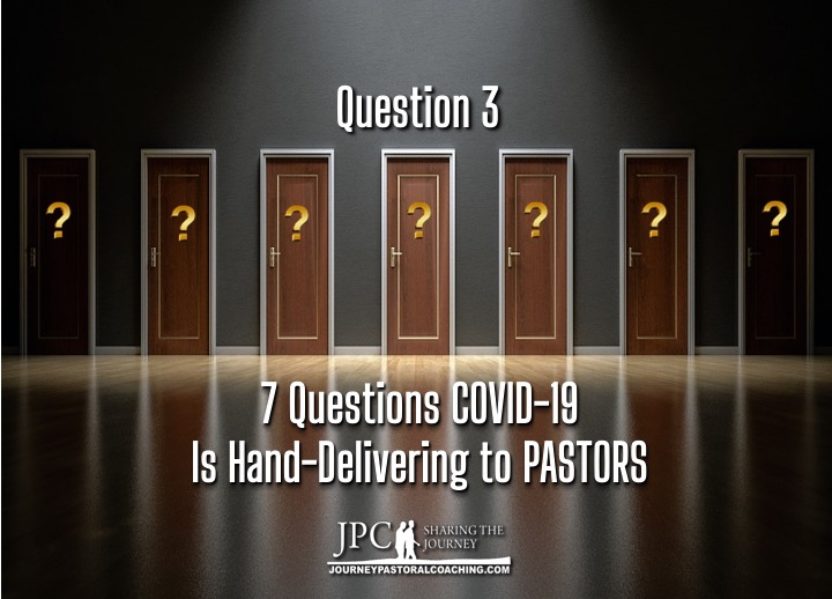7 Questions COVID-19 is Hand-Delivering to PASTORS: Question #3
QUESTION 3:
Will this lead to more pastoral care among people who are suffering?
In the business model church in the 20th-Century, shepherds morphed into CEOs, talking vision statements, 5-year plans, numbers, and programs. Pastors came to see their primary role as that of business leader and vision-caster.
With the advent of the digital age, CEO pastors are morphing into prime time talking heads and the language has changed to hits, viewers, and followers. Many pastors have come to see their primary role as programming head and the “face-of-the-brand.” Homework assignment: do a quick study of church websites for an eye-opening experience.
The result in each case: Psalm 23 shepherding seems as foreign to many American pastors as moules marinières or driving on the left side of the street. Pastoral care has been de-emphasized, in particular, in evangelical churches. Not always, of course, but go back and examine the books written, the must-attend seminars, and the ministers’ conferences of the past two decades and you’ll be hard pressed to find pastoral care as a major theme. Examine the preaching record and ministry of local churches today and pastoral care is clearly a second-tier ministry. Fewer and fewer people in the pew say their pastors know them and share their journey.
This is most especially apparent when it comes to providing pastoral care for the suffering and dying. (It’s one reason I wrote a book on the subject – When the Call Comes: Sharing the Journey With Those Who Mourn.)
And this is very strange, given that the intersection of church history and world history has so often and so powerfully proven to be at the crossroads of human suffering.
In each of the second, third, and fourth centuries, pandemics far deadlier – killing one in four – than COVID-19 struck the Roman Empire. Pastors like Cyprian not only called Christians to care for the dying, but personally stayed with the dying and led the way in providing physical and spiritual care. Roman Emperor Julian complained angrily that “the Galileans” were even taking care of non-Christians who had been afflicted. It was this kind of pastoral ministry that had far more to do with the massive numbers of conversions to Christ in the Roman Empire than any political edict by Emperor Constantine. It can fairly be said that the church successfully evangelized the entire Roman Empire at bedsides and graves. And, yes, in coliseums. Ours is a history well-acquainted with grief (Isaiah 53.3).
In 1527, the bubonic plague came to Germany, killing fifty percent of many cities’ population in just months. Though he was the recognized leader of the Reformation, Martin Luther and his pregnant wife Kathryn made the decision not to heed the pleas of friends and colleagues, but chose to remain among their flock in Wittenburg and minister to the sick and dying. After the plague had finally passed, Luther explained his decision:
Those who are engaged in a spiritual ministry such as preachers and pastors must likewise remain steadfast before the peril of death. We have a plain command from Christ, “A good shepherd lays down his life for the sheep but the hireling sees the wolf coming and flees” (John 10:11). For when people are dying, they most need a spiritual ministry which strengthens and comforts their consciences by word and sacrament and in faith overcomes death…
Amidst two devastating cholera epidemics in London in the 19thcentury, Pastor Charles Spurgeon did not flee the city for safety. He stayed with his flock, ministering daily to the dying and their families, always at great personal risk. When asked why he did so, in the moment Spurgeon responded,
“And now, again, is the minister’s time; and now is the time for all of you who love souls. You may see men more alarmed than they are already; and if they should be, mind that you avail yourselves of the opportunity of doing them good. You have the Balm of Gilead; when their wounds smart, pour it in. You know of Him who died to save; tell them of Him.”
Jesus said it this way in John 10.11-15:
“I am the good shepherd. The good shepherd lays down his life for the sheep. He who is a hired hand and not a shepherd, who does not own the sheep, sees the wolf coming and leaves the sheep and flees, and the wolf snatches them and scatters them. He flees because he is a hired hand and cares nothing for the sheep. I am the good shepherd. I know my own and my own know me, just as the Father knows me and I know the Father; and I lay down my life for the sheep.”
Pastor, I know that this is a very difficult question for us to ask ourselves. But it is not a question we can avoid. With COVID-19 in our rearview mirror and COVID-20 Something, or some other crisis ahead, we have to ask ourselves if we will be leaders in the mold of Gates, Jobs, and Musk, or leaders in the mold of Luther, Spurgeon, and Cyprian – leaders like Jesus? Will we share the sufferings of Jesus and people He came to save?
———-
NOTE: Journey Pastoral Coaching exists to provide pastoral coaching to Millennial ministers.
Saddled with large student debt, just beginning to set up homes and start families, and serving in low paying first and second positions, Millennials are those who most desire but can least afford to pay for pastoral coaching.
We are able to do so thanks to the faithful and generous support of individuals and churches like yours who want to see young leaders not only enter the ministry, but remain in the ministry.
Now, more than ever, we need your help.
If you or your church would like to help Millennial ministers in 20 US states and 5 nations build strong for a lifetime in ministry, please click here to contact us by email or to support Journey monthly or with your one-time gift. Thank you.
We also invite you to click and subscribe to our twice-monthly blogs at journeypastoralcoaching.com
“In the early years when I was becoming a pastor, I needed a pastor.”
Eugene H. Peterson, The Pastor: A Memoir



